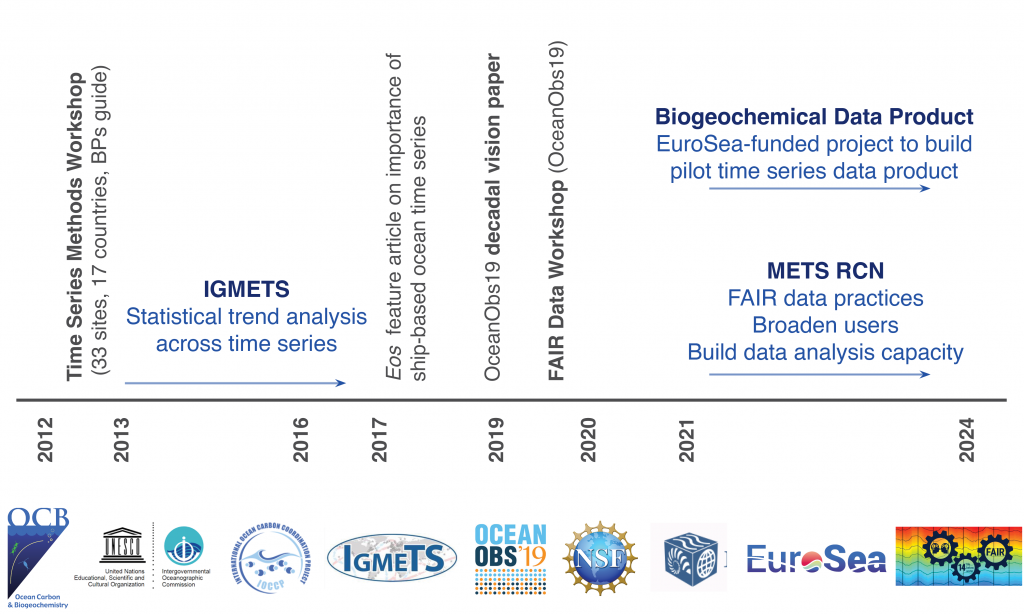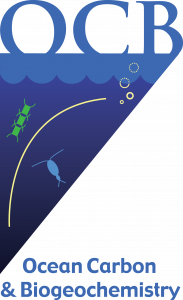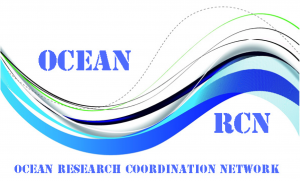Workshop postponed
Sustained ocean time series measurements are fundamental to distinguish between natural and human-induced variability in ecosystems and processes required to advance ecological forecasting. The last international ship-based ocean time series workshop, held in November 2012 (Bermuda), focused on recommendations to improve data comparability. Over the past decade (Fig. 1) the ocean observing community has contributed to numerous efforts and activities in support of building a global network of ocean time series with the aims of:
- Elevating the visibility and utility of these observing assets for understanding climate-ecosystem links
- Improving coordination, communication, and scientific synthesis products across ocean time series programs/sites
- Building consensus on foundational components such as methods and FAIR data practices

Figure 1. Timeline of shipboard ocean time series community-building activities and products from 2012-present. Scroll down for linked resource list to access any of these products.
A lack of Marine Ecological Time Series (METS) data and metadata reporting standards, combined with numerous disconnected data management efforts, makes it exceedingly difficult for prospective time series data users to find and gain access to these valuable and unique datasets. For many of the biogeochemical and biological parameters that are unique to ship-based Marine Ecological Time Series (METS), there is an urgent need to develop consensus on community-adopted data and metadata reporting standards that will make these data more Findable, Accessible, Interoperable, and Reusable (FAIR).
To address key recommendations from a small 2019 meeting focused on FAIR data practices for ocean time series, a NSF EarthCube-funded METS Research Coordination Network started in 2021. The goals of this RCN are to: Develop and build consensus around FAIR data solutions for ship-based ocean time series; broaden METS data users and applications; and build capacity for METS data analysis, statistics, and data-model integration. Small group meetings over the past two years, as well as an in-person meeting in Boston in April 2023 have enabled members of this team to develop initial use cases for biogeochemical and biological variables commonly measured by ocean time series programs. With the aim of improving data workflows and facilitating more scientific synthesis across time series programs, we are developing a profile for ship based ocean time series in the UN Decade-endorsed Ocean InfoHub.
Parallel to this effort, METS RCN leadership team member Nico Lange (GEOMAR) has led the development of a pilot biogeochemical ocean time series data product (Lange et al., In rev.) with funding from EuroSea.
This workshop will bring together globally distributed ship-based ocean time series representatives who are interested and committed to FAIR data practices with data managers and experts in semantic web technologies with the following objectives:
- Share and vet newly drafted biogeochemical and biological use cases for adoption by the broader METS community
- Work with participating time series representatives to implement these use cases for their time series programs
- Co-develop best practices for responsible use of ocean time series datasets (as a contribution to the Ocean Best Practices System repository)
- Share new findings and update recommendations on sampling and analytical protocols from the 2012 Bermuda Time Series Methods Workshop
- Explore mechanisms (and identify champions!) for engaging broader stakeholders (managers, educators, etc.) in the use of ocean time series data sets
- Start planning (and identify champions!) for an Ocean HackWeek for ocean time series data
Relevant resources and references
- Lange, N. et al. (In prep.). A ship-based biogeochemical time-series synthesis product. Earth System Science Data.
- Benway, H., J. Buck, L. Fujieki, D. Kinkade, L. Lorenzoni, M. Schildhauer, A. Shepherd, A. White (2020). NSF EarthCube Workshop for Shipboard Ocean Time Series Data Meeting Report. 59 pp. DOI 10.1575/1912/25480
- Benway, H. M., L. Lorenzoni, A. E. White, B. Fiedler, N. M. Levine, D. P. Nicholson, M. D. DeGrandpre, H. M. Sosik, M. J. Church, T. D. O’Brien, M. Leinen, R. A. Weller, D. M. Karl, S. A. Henson, R. M. Letelier (2019). Ocean time series observations of changing marine ecosystems: An era of integration, synthesis, and societal applications. Frontiers in Marine Science, https://doi.org/10.3389/fmars.2019.00393
- Neuer, S., H. Benway, N. Bates, C. Carlson, M. Church, M. DeGrandpre, J. Dunne, R. Letelier, M. Lomas, L. Lorenzoni, F. Muller-Karger, M. J. Perry, P. Quay (2017). Monitoring ocean change in the 21st Century. Eos 98, doi:10.1029/2017EO080045 (published on 08 September 2017).
- Benway, H. M., M. Telszewski, and L. Lorenzoni (2013), Improving Intercomparability of Marine Biogeochemical Time Series, Eos Trans. AGU 94(17), 160.
- Lorenzoni, L., Benway, H. M. (Eds), 2013. Report of Global intercomparability in a changing ocean: An international time-series methods workshop, November 28-30, 2012, Ocean Carbon & Biogeochemistry (OCB) Program and International Ocean Carbon Coordination Project (IOCCP), 61 pp. DOI: http://dx.doi.org/10.25607/OBP-12.



